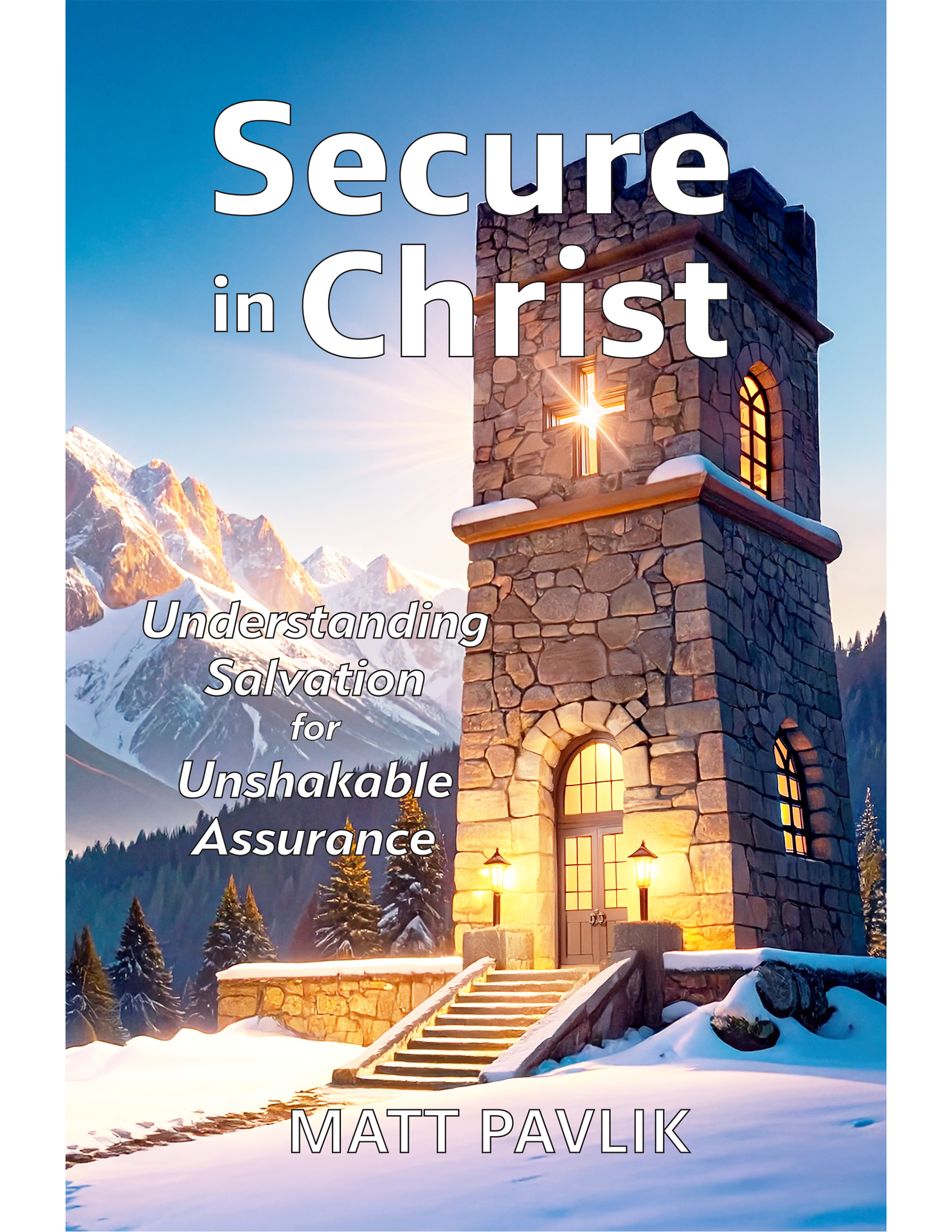Adam was at first good, and very good. But he fell into sin and experienced spiritual death. He broke like a jar of clay. Some believe this to be an instance of apostasy. The following shows this cannot be possible.
Adam Did Not Lose His Salvation When He Fell
Adam did not have salvation before the fall, so he could not have lost it. God brought Adam (and Eve) into this world differently than all following humans. God created them directly but the rest of us were brought into this world through physical birth. Adam was created without sin but with the potential for sin. The rest of us are born into sin without a choice in the matter. We don’t only have the potential to sin, we are born spiritually dead, sinning from the beginning. Adam knew what it was like to be without sin but he did not know what it is like to be immune to sin because he always had the potential to sin.
Although Adam was good, he was but a natural man. God formed his body from the dust, perishable. But when God raises a person, the body is spiritual, imperishable.
So is it with the resurrection of the dead. What is sown is perishable; what is raised is imperishable. It is sown in dishonor; it is raised in glory. It is sown in weakness; it is raised in power. It is sown a natural body; it is raised a spiritual body. If there is a natural body, there is also a spiritual body.
Thus it is written, “The first man Adam became a living being”; the last Adam became a life-giving spirit. But it is not the spiritual that is first but the natural, and then the spiritual. The first man was from the earth, a man of dust; the second man is from heaven. As was the man of dust, so also are those who are of the dust, and as is the man of heaven, so also are those who are of heaven. Just as we have borne the image of the man of dust, we shall also bear the image of the man of heaven.
1 Corinthians 15:42-49 ESV
Adam was under the law, while saints are not under the law, but under grace, and sin shall not have dominion over them (Romans 6:14). God does not impute sin to saints.
In Christ, God was reconciling the world to himself, not counting their trespasses against them, and entrusting to us the message of reconciliation.
2 Corinthians 5:19 ESV
God considers the saints as righteous without them performing any works. David calls the saints blessed because their sins are never counted against them (Romans 4:6-8). So he does not impute sin to his people, and he did impute sin to Adam. We know this because Adam died spiritually and God removed him from the garden.
Christ dwells in His saints, but He did not dwell in Adam. “Little children, you are from God and have overcome them, for he who is in you is greater than he who is in the world” (1 John 4:4 ESV). “He who raised Christ Jesus from the dead will also give life to your mortal bodies through his Spirit who dwells in you” (Romans 8:11 ESV). Many passages show that Christ dwells in his people; and there is no evidence that he did dwell in Adam, for before the fall there was not (yet) the need of a Christ.
Saints do not stand justified for their righteousness, while Adam’s only hope was in his record of keeping the law.
God chose what is low and despised in the world, even things that are not, to bring to nothing things that are, so that no human being might boast in the presence of God. And because of him you are in Christ Jesus, who became to us wisdom from God, righteousness and sanctification and redemption.
1 Corinthians 1:28-30 ESV
Therefore, Christ is the righteousness of saints. No human can boast in their righteousness but must rely solely on Christ’s. The saints’ justification comes from God, not by any self-effort.
But in that coming day
Isaiah 54:17 NLT
no weapon turned against you will succeed.
You will silence every voice
raised up to accuse you.
These benefits are enjoyed by the servants of the Lord;
their vindication will come from me.
I, the Lord, have spoken!
Saints Cannot Lose Their Salvation
Saints are not vulnerable to sin like Adam because they have experienced a spiritual rebirth. If Adam’s righteousness had been of the Lord, and if Christ had been his righteousness, he would not have fallen; but such was not the case with him, and therefore he fell; yet such is the case with saints, and therefore, they will not fall.
Saints are inclined to keep the law, or to do the will of God; for God works in them both to will and to do of His good pleasure (Philippians 2:13). If God had worked in Adam to do His pleasure, the result would have been different. God not only makes His saints sufficient to meet the demands of the law, but He also keeps them to that standard by His Holy Spirit dwelling in them. They are shielded, so that the wicked one cannot touch them.
Christ is the strong tower into which the righteous run and are safe. He is the rock of ages and is to them a high rock in a weary land. God has appointed salvation as walls and bulwarks around the saints.
I have never heard an argument made in favor of apostasy, without a false foundation: that salvation is by works. The Bible abounds with obvious contradictions of this position. Have you ever heard any man defend the doctrine of apostasy, urging that it is by works that we become saints and continue to be saints, but also admit that there is no merit in works and that all the merit is in Christ? What a messy contradiction.
If salvation is by works, then Christ’s blood is to be of no avail, and the whole plan of salvation is a failure. If by works, then Heaven could be empty, and hell full of the purchased by the Savior’s blood. No matter how often or how positively God’s word says it is not of works, despite all this, the advocates of apostasy invariably declare salvation to be of works.
How shocking the thought that a man may miss Heaven, though he has
- been redeemed by the blood of Christ.
- been born of the Spirit and incorruptible seed, even born of God.
- in him the very Spirit that raised Jesus from the dead.
- Christ within him and his life hidden with Christ in God.
- eaten the Savior’s flesh and drank his blood.
- drank of the water of life.
- been built upon Christ as a sure foundation.
- been joined to him as a wife to a husband.
- rejoiced in the thought that the God of the whole earth is his shepherd and that he shall not want.
- said with joy, The Lord is my rock and my fortress, my deliverer and my God, my strength in whom I trust, my buckler and the horn of my salvation, and my high tower.
Despite all this, some believe he may lose his salvation and go to hell forever. How discouraging such an idea would be to those who are weak, who say, “When I would do good, evil is present with me. Oh, wretched man that I am! Who shall deliver me from this body of death?” If there is a doctrine calculated to starve the weak, to discourage mourners in Zion, to fill the wicked with carelessness on this subject, this is the doctrine. Who could or would with courage seek the blessing of salvation, if the odds are a thousand to one against remaining saved?
Thankfully, the Bible is clear that salvation is for eternity. This never means that saints can sin as much as they want–that would be the attitude of the unsaved. Only the saved, by God’s power, leave behind the constant desire to sin.
This is post 22 in a series; you can read the previous post. This post started as the public domain works of J. H. Oliphant. While sections are the same in many ways, I modernized the language and added my thoughts to provide greater clarity for my readers.
Image by dime868 from Pixabay
Matt Pavlik is a professional counselor, author, and devoted follower of Christ. With decades of experience in Christian counseling, he writes with theological depth and everyday clarity. His resources—centered on salvation, identity, marriage, and emotional healing—are anchored in Scripture and guide believers to discover the freedom of their identity in Christ and the security of their salvation in Him. He and his wife Georgette, married since 1999, live in Centerville, Ohio, and have four adult children.




[…] is post 23 in a series; you can read the previous post. This post started as the public domain works of J. H. Oliphant. While sections are the same in many […]